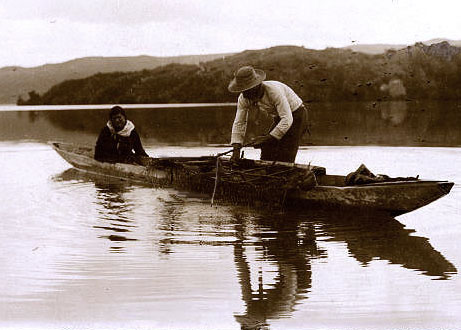| |
|
Taku
wairua ora e Ka
haere, ka haere |
Will
my spirit stay with me |

Variations
"Ka te hi au e" are the syllables that everyone sings, and we know it is a fishing song, but what exactly does that line mean? Take your pick....
Ki te hī au e - To the fishing I've come
Kati hī au e - It bites! I've caught a fish!
Kite hī au e - I've found a fish and I'm going to catch it
|
Usually
only the first sequence is sung, being repeated
several times. But I found this second verse about old
people coming to get the fish, on a version recorded
by the Kingston Trio on their "Close Up" LP in 1961, Ka
haere, ka haere Wairua
ana rei Two of the Trio were born and educated in Hawaii, where they began their careers singing Hawaiian and Tahitian songs. Many Maori songs were covered, and sometimes modified, in Tahiti. This Kaumaua version probably came from Tahiti, possibly directly from the Cooks. |
Turakina Maori Girls Choir
Their version has beautiful echoing harmonies.
Deane Waretini
And in complete contrast, here is Deane Waretini and the Arawa Concert Party in 1949. The singing is too fast and too technical for my liking, but you may enjoy it. Waretini MP3
Origins
|
| Tekiteki
karu, Karu ai na po. |
Dance
to the loosening, The loosening of the nights. |
The word karu means the loosening of a rope. The passing of the nights of the old year is thus figuratively referred to as the loosening of the rope that bound them together." Ethnology of Tongareva
So maybe in Cook Island Maori, Ka rū, karu, ka te hī au e, referred to the fisherman's anxiety as he pulls up the line - "It quivers, then goes loose, quivers, then goes loose - will I be lucky or not?"
In NZ Maori the loosening of a rope is kaewa.Himene
Note that a himene is not a church hymn, but a style of singing in the Tahitian and Cook Islands based on hymn tunes.
Arrangements often use a combination of the original Polynesian drone harmonies with western-influenced third harmonies, combining the old and new.
Webpage
published 5 October, 2007, revised 2020
